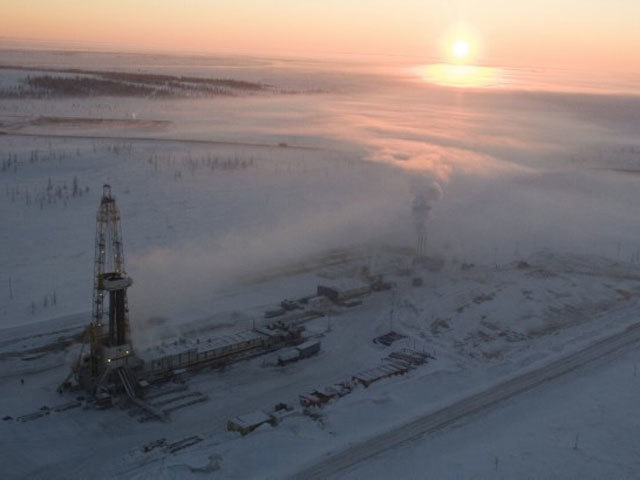
Nikolai Buynov’s introduction to the oil industry came by way of a motor-oil salesman who visited his native Siberia in 1995 loaded with “beads and mirrors for the natives.”
Buynov, a graduate of the Leningrad Institute of Rail Engineers who’d been running a fuel and lubricants trading business, ignored the trinkets and seized upon another of the salesman’s offerings: a book on the history of Royal Dutch Shell.
“After reading it, I wanted to create my own oil company – – neither more nor less,” he said in a Sept. 10 e-mail.
He began buying oil and gas producers in the region in 1997, uniting them into Irkutsk Oil Co., Russia’s 10th-largest oil producer. With partners including Goldman Sachs Group Inc. and the European Bank for Reconstruction and Development, Irkutsk Oil had revenue of $2 billion in 2013, pumping more than 50,000 barrels a day of oil and condensate.
While that’s a fraction of the 5 million barrels pumped by state-owned OAO Rosneft, it’s made Irkutsk Oil one of the industry’s most sought after companies, said Alexander Nazarov, an analyst at OAO Gazprombank. It’s also made Buynov a billionaire. The 47-year-old, who controls 62 percent of the company, according to Interfax’s SPARK database, has never appeared on an international wealth ranking. He has a net worth of at least $1.1 billion, according to the Bloomberg Billionaires Index.
Buynov confirmed he owns more than 50 percent of the company, and disputed he’s a billionaire.
“I disagree with the valuation,” he said in the e-mail, without elaborating further.
Located in East Siberia, near Lake Baikal and north of Mongolia, Russia’s Irkutsk region has benefited from President Putin’s push for closer relations with Asia. Resources in the area were basically stranded prior to the construction of the Kremlin’s strategic East Siberian Pacific Ocean pipeline. The project, completed in 2009, opened Asian markets for Russian energy.
Irkutsk Oil said it has increased production at a compound annual growth rate of 28 percent since 2001, and is ranked second among Russia’s fastest-growing companies this year, according to Russian business news agency RBC. The company plans to more than double its output to more than 120,000 barrels a day in the next three years, Chief Executive Officer Marina Sedykh said in an interview at the company’s headquarters in Irkutsk.
The business is valued at about $1.6 billion, according data compiled by Bloomberg, based on the average enterprise value-to-earnings before interest, taxes, depreciation and amortization multiple of three publicly traded peer companies: London-based Exillon Energy Plc, Nostrum Oil & Gas Plc and Dragon Oil Plc. Enterprise value is defined as market capitalization plus total debt minus cash.
Irkutsk Oil could be worth about $2 billion, based on the $2 billion OAO Lukoil paid in April 2013 to purchase Hess Corp. subsidiary Samara-Nafta ZAO, which had similar output levels. Buynov’s fortune is based on the average of both valuations.
Gazprombank’s Nazarov, who said the company would make an “interesting” acquisition, values the company at $3 billion based on its recent output.
“It’s the largest independent left in Russia and not connected to any large group of interests,” he said.
Born and raised in Irkutsk, Sedykh is the only female CEO in the Russian oil and gas industry, and is a minority shareholder in company, along with Goldman Sachs and the EBRD. She left her post as lead lawyer on a state exploration agency to join Buynov in the creation of the company in 2000. While Buynov provided the entrepreneurial drive, Sedykh ensured the company’s foundation rested on firm legal ground.
“My main principle in life is: Never let yourself be blackmailed,” Sedykh said. “Don’t create conditions that allow people to blackmail you. Do everything according to the law, distinctly and accurately.”
The approach helped provide footing for the young business, which was built in the years following the collapse of the Soviet Union, an era marked by economic chaos and a rough-and- tumble business environment.
“She is a real tough lawyer. We are alive because of that,” said Buynov, referring to Sedyhk’s insistence on creating proper legal structures, in an interview in Moscow in October.
The Irkutsk Oil board considered an initial public offering in 2012. An IPO, which was required to be considered by a 2008 partnership agreement with EBRD, was rejected when they saw that selling equity would be the most expensive way to raise money, according to Buynov. Instead, the bank decided to cash out with a partial exit in 2013 selling a 3.8 percent stake to Goldman Sachs.
“It is important for EBRD that in addition to the financial and operational success, Irkutsk has achieved the highest environmental and social standards for the industry,” EBRD spokesman Richard Wallis said in an e-mail.
A spokesman for Goldman Sachs at Moscow-based EM Communications declined to comment.
Russia’s ties with Asia, which include the $400 billion deal that state gas exporter OAO Gazprom signed with China in May, has also helped attract Japanese capital to the region. Irkutsk Oil has formed two joint-venture exploration partnerships with Japan Oil Gas and Metals National Corp. in East Siberia.
Still, the lack of transportation in the region and a limited customer base have hindered the company from selling outside the area. The May deal with China includes an agreement to build a pipeline — right now reserved for the exclusive use of Gazprom — which could boost economic development for the whole region, Sedykh said.
Sedykh says management will continue to build the company and keep it rooted in its East Siberian home. The city, with a population of about 600,000, surrounded by hundreds of miles of inhospitable wilderness, is also know as the country’s home for exiled nobles in the time of the czars.
“We have taken the position that we have built this company from zero. We live here, we work here, our children live here,” she said. “We’re developing the company as we see fit.”
Recommended for you
